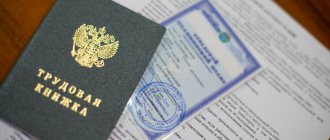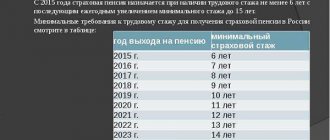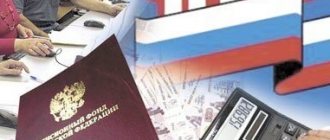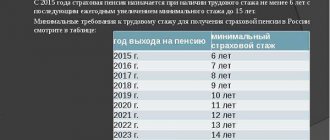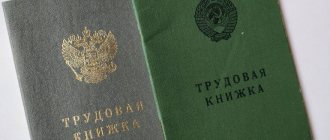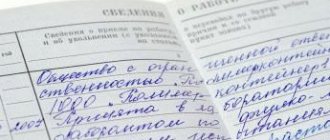What is a preferential pension and preferential length of service for teachers?
The laws of the Russian Federation allow people who are engaged in teaching activities to retire on preferential terms. Thus, for teachers and educators, retirement is provided regardless of age based on length of service in positions specified by law held in children's institutions. The preferential length of service required for early retirement as a teacher is 25 years. The calculation of special experience for the assignment of a preferential pension for teachers is regulated by Decree of the Government of the Russian Federation N 781 of October 29, 2002. In a later amendment, only the wording of the name of the pension changed, so this document is considered current.
Formation of a pedagogical pension for kindergarten teachers
Due to the specific nature of their work, teaching staff are subject to significant psycho-emotional stress, which negatively affects their health and ability to work. In addition, working with children involves a greater degree of responsibility, which also gives pedagogical activity a special specificity.
In this regard, the state provides a number of benefits and concessions for this category of workers. This also applies to early retirement. Thus, kindergarten teachers have the right to submit applications to receive pension payments if they have a certain teaching experience.
In essence, this procedure for the formation of pension rights represents length of service. It should be recalled that it is precisely on the principle of having sufficient special experience that civil servants, military personnel, representatives of law enforcement agencies and some other fields of activity retire.
However, in modern practice, it is not customary to call the special experience of teachers and physicians length of service, since, in addition to its availability for the persons in question, they are also subject to other requirements for the assignment of pension benefits.
So, it has been found that one of the most important grounds for the retirement of preschool teachers is the presence of sufficient special experience. However, it is developed only under the condition of labor activity in certain institutions and in relevant positions.
Thus, their complete lists are contained in the Decree of the Government of the Russian Federation dated October 29, 2002 No. 781. They are quite extensive and include more than a dozen positions. As for kindergarten workers directly, beneficiaries should include those who are directly involved in teaching activities.
These are, among others:
- educators;
- speech therapists;
- music workers;
- educational psychologists.
Supporting, administrative (for the most part) and technical staff of preschool institutions are not among the beneficiaries.
Important! Junior educators (nannies) are not teaching staff, even if they have a specialized education. In this regard, this category of preschool educational institution employees is not entitled to count on pension benefits.
In addition, it is legally established that teaching experience includes time spent working in state (municipal) preschool institutions. This means that if, for example, a teacher works in a private kindergarten or provides educational services privately, then these periods are not included in the length of service.
The formation of pension rights for teachers is carried out in the same way as for the majority of the working population of the country. The pension is assigned by application when applying to the state pension fund.
It should be noted that if an education worker decides to receive well-deserved payments, then he can no longer work in this area, which, however, does not prevent him from carrying out other types of work.
The procedure for applying to the Pension Fund of Russia is standard , however, when preparing documents, it is necessary to obtain in advance the necessary certificates about the existence of a special right, as well as check the correctness of the existing entries in the work book.
What positions qualify as teaching experience?
Resolution No. 781 contains lists of institutions and possible positions in which 25 years of work experience allows for early retirement. In generalized form, these lists can be presented as follows.
| Job titles | Name of institution |
| Director (chief, manager); deputy director (chief, manager); head of academic department; duty officer; teacher; educator; organizer of extracurricular and out-of-school educational work with children; master of industrial training; teacher; speech therapist; hearing room instructor; teacher-speech pathologist; head of physical education; trainer-teacher; musical director; teacher-organizer of the basics of life safety (pre-conscription training); head of pre-conscription youth training; military leader; social teacher; educational psychologist; labor instructor; teacher-educator; nursery nurse; teacher; parent-educator; teacher of additional education and others. | 1. General educational institutions. 2. General education boarding schools. 3. Educational institutions for orphans and children left without parental care. 4. Health educational institutions of sanatorium type. 5. Special (correctional) educational institutions for children with developmental disabilities. 6. Special educational institutions of open and closed type. 7. Educational institutions for children of preschool and primary school age. 8. Preschool educational institutions. 9. Institutions of primary vocational education. 10. Educational institutions of secondary vocational education. 11. Educational institutions for children in need of psychological, pedagogical and medical and social assistance. 12. Interschool training center. 13. Social service institutions. 14. Health care institutions. 15. Institutions for additional education of children. |
The right to early retirement for teachers whose position has changed
Due to changes in some job titles and so that employees who work in positions not listed in the Lists do not lose the right to early retirement for teachers, special documents have been developed that allow the use of identical job titles:
- Any job titles related to educational activities are included in the preferential list, which gives the right to early pedagogical retirement.
- The list also includes such positions as “musical worker” or “musical director,” which, in essence, are the same thing.
Those teachers whose job titles have changed, but their names are identical to the positions from the above List, can also apply for early retirement for teachers.
Interesting: Early retirement for medical workers.
Rules for calculating teaching experience
In addition to the list of organizations and positions in which work is a necessary condition for preferential retirement for teachers, Resolution No. 781 also contains a set of rules for calculating preferential length of service for teachers. According to these rules, various positions may have restrictions or advantages when calculating teaching experience.
Let's look at the main ones of these rules.
- Since September 1, 2000, only full-time work is counted toward teaching experience. In this case, it is possible to combine several positions in one period of time, and if the work on them totals a full-time salary, this period is counted as special length of service. The work of a teacher before September 1, 2000 is counted regardless of the development of the norm.
- For employees of a number of institutions (social services, for children in need of special assistance), as well as for music directors, it is mandatory to develop standard working hours, regardless of the period of work.
- The work of primary school teachers and teachers of rural schools is counted towards teaching experience regardless of the fulfillment of working hours.
- Work in the position of director of an educational institution since September 1, 2000 is counted only if teaching activities are carried out for at least 240 hours per year for general education institutions and 360 hours per year for secondary special education. Until 2000, such work was included in the teaching experience regardless of teaching.
- Work in listed positions in institutions of secondary specialized and primary vocational education, evening schools is counted towards teaching experience, provided that at least 50% of children under 18 years of age were studying at the institution during the specified period.
Why do you need teaching experience?
First of all, you need to understand that teaching experience is a special period that applies only to certain categories of activity. For example, special experience includes agricultural activities, industry, medicine and education. Teaching experience, like any official work activity, gives the right to receive a pension.
What is included in teaching experience?
In addition to directly working in these positions, teaching experience also includes other periods of life and activity, subject to certain conditions being met, namely:
- Leave to care for a child up to 1.5 years, no more than 6 years in total, provided that such leave began before October 6, 1992, when the law came into force according to which leave to care for a child up to 1.5 years is not included in the teaching experience turns on.
- Advanced training courses, if they took place after September 1, 2000 and during the years of their completion the annual standard of working hours corresponding to the wage rate was met.
- Time of study at a university, if the studies were completed before October 1, 1993, and teaching activities were carried out immediately before the start and after completion of the studies.
- Compulsory military service, provided that the service was completed before October 1, 1993. Often, to include this period in the teaching experience, it is necessary to go to court.
- Periods of temporary incapacity for work (sick leave).
- Paid holidays, except educational leave.
Procedure for assigning early old-age pension to teaching staff
After all the necessary papers are provided to the Pension Fund of Russia, specialists will check the compliance of the entries in the work book with the List of schools and specialties. If any doubtful points appear, additional papers are requested.
After the papers are reviewed, the fund’s specialists will make a decision on granting a pension or denying this right. If you believe that your rights have been violated, you can file a claim and challenge the Pension Fund’s response in court.
Interesting: What should a pensioner do in retirement and earn money? TOP ways for women and men to earn money in retirement.
How the conditions of preferential length of service for teachers are changing from 2020
In connection with the pension reform, starting from 2021, the conditions for preferential retirement for teachers have changed. The main changes in matters of early retirement for teachers concern the use of individual pension points (IPC) and deferment of retirement based on length of service. The period from 2021 to 2025 is a transition period for the full implementation of the new conditions, so different restrictions will apply in different years of this period.
So, in 2021, for a preferential retirement, you need 18.6 points; in 2025, this figure will reach 30 and remain at this level, for which the value will increase every year by 2.4 points. Minimum required number of pension points for early retirement, depending on the year
| Year of retirement | 2020 | 2021 | 2022 | 2023 | 2024 | 2025 |
| IPC | 18,6 | 21 | 23,4 | 25,8 | 28,2 | 30 |
As for deferring the registration of a pension after completing 25 years of teaching experience, the maximum value of this period will be reached by 2023 and will be 5 years. That is, if previously a long-service pension could be issued immediately, as soon as the teaching experience was 25 years, now it will be possible to retire only after a deferment period has passed after it has been completed. In 2021, the deferment period is 1.5 years. Then each year its duration increases.
Deferment period for obtaining a preferential pension for teachers depending on the year of teaching experience
| Year of retirement | 2020 | 2021 | 2022 | 2023 |
| Grace period | 1,5 | 3 | 4 | 5 |
Preferential retirement for teachers from 2021
| Year of teaching experience | Conditions for early retirement | Year of retirement | |
| Grace period | Points | ||
| 2020 — I half of the year | 1,5 | 21 | 2021 — II half of the year |
| 2020 — II half of the year | 1,5 | 23,4 | 2022 — I half of the year |
| 2021 | 3 | 28,2 | 2024 |
| 2022 | 4 | 30 | 2026 |
| 2023 | 5 | 30 | 2028 |
| 2024 | 5 | 30 | 2029 |
How to calculate your pension
When calculating a teacher's insurance pension, a number of factors are taken into account. These, first of all, include insurance period , which today is calculated in the form of IPC pension points. The number of points depends on the length of work experience during which they were accrued. The size of the teacher’s salary also has an impact, since each point has its own monetary equivalent.
Additional factors influencing the amount of pension benefits include length of service , the number of years worked after retirement age.
To accurately calculate the amount of pension due to a teacher, you can use the online calculator located on the official portal of the Pension Fund.
To receive the approximate amount of your pension benefit, you will need to fill out an electronic form with the required information.
How to calculate teaching experience under new conditions
The calculation of teaching experience in 2021 is carried out in accordance with the legislative acts of pension legislation of different years and Federal Law No. 350-FZ of October 3, 2018, depending on the periods of work of each specific teacher. The calculation is based on a list of positions and institutions and a set of rules for calculating teaching experience, which are contained in Resolution No. 781.
Let's look at some calculation examples.
1. The applicant graduated from a pedagogical university in 1995. 1995 - 2012 - work as a secondary school teacher. 2012 - 2015 - work as the head of the educational department. 2015 - beginning of 2021 - work as a director of a secondary school with teaching activities. In this case, the applicant has 25 years of teaching experience, subject to the development of a standard working time equal to the rate in the position of teacher and head teacher and conducting teaching activities in the position of director for at least 240 hours per year. The period of study at a university is not included. May qualify for early retirement in the second half of 2021 (deferment) if he has 21 pension points.
2. The applicant has the following periods: from August 15, 1991 to January 17, 1992 – working as a teacher in a secondary school; from January 18, 1992 to September 1, 1993 - maternity leave; from September 1, 1993 to August 20, 2000 - work as a teacher in a secondary school; from August 21, 2000 to August 23, 2004 - work as a teacher in a secondary school at ½ rate; from August 24, 2004 to August 20, 2021 - working as a teacher in a secondary school.
In this case, the total experience is 29 years, but the teaching experience is also 25. It includes the period of maternity leave, since it began before October 1992, but does not include the period of work at 0.5 rates. The applicant can retire in the first half of 2022 and must have 23.4 pension points.
Pension size: what does it depend on?
The main parameter that determines the right to receive social benefits is length of service (must be at least 25 calendar years). It includes:
- the time that the worker spent on professional activities;
- periods of training/retraining in pedagogical universities, provided that both before and after them the employee was associated with the educational sphere. The same applies to improving his professional qualifications;
- vacation and sick pay;
- child care (up to one and a half years old) - only for women who were engaged in teaching before the fall of 1992.
The time period spent by a woman caring for her own child (not older than one and a half years) for other women is included exclusively in their insurance period, but in total no more than six years if there are several children.
Types of experience
In this case, the employee must be present at his workplace for a certain number of hours - on average eighteen per week for employees of general education institutions. The exact values depend on the region of residence and are indicated in the Order of 2010 (N 2075, issued by the Ministry of Education and Science). Since 2015, the following requirements for the minimum number of hours per working week have been introduced:
- 36 - persons teaching at universities, educational psychologists, labor and physical education teachers, chief pioneer leaders, librarians, as well as developers of teaching methods;
- 30 - mentors in kindergartens and other preschool institutions;
- 25 - category of teachers involved in teaching minors who have health defects;
- 24 - persons teaching music disciplines;
- 20 - speech therapists, as well as defectologists in kindergartens, nurseries, and educational institutions;
- 18 - professional school teachers, teachers involved in additional education, coaching staff of sports schools, mentors in music or art schools, as well as people teaching various foreign languages in kindergartens;
- 720 hours per year - applies to teachers working in secondary or secondary specialized institutions.
Fulfilling the duties of mentors in primary school classes, as well as rural teachers, is included in the special preferential length of service and will not depend in any way on the volume of workload performed: the number of hours per working week will not affect the deadlines for registration.
Workload standards for educational workers
The influence of other factors on pension payments: if an employee has an academic degree, this allows him to qualify for higher pay, but does not affect the period for receiving a pension.
Pension calculation rules
The employer pays certain amounts to the Pension Fund, which make up the future pension. In addition to length of service, the average salary of an employee is important. It depends:
- from the load on the teacher;
- his positions - for the work of the director, head teacher, rector, higher payments are made. Often managers are also involved in teaching;
- compensation for category, academic degrees;
- region of residence - increasing coefficients are provided for the Far North.
An appropriate amount will be added to the cost of living.
Data on early pensions for “northerners”
Reference: the maximum pension for a teacher is 75% of his average salary.
How to calculate a pension: Russian Pension Fund calculator
The entire pension consists of funded and insurance parts. The counting rules are the same as for other citizens of the Russian Federation. The insurance pension of a citizen of the Russian Federation is calculated in this way: the amount of accrued points is multiplied by the price of one pension point, which is determined each year. The amount of the fixed payment is added to the amount received. When calculating the approximate amount of the insurance pension, the portal of the Pension Fund of the Russian Federation posted the following information (relevant for 2021):
- fixed payment – 5334 rubles;
- one pension coefficient costs 87.24 rubles;
- maximum salary (before deduction of personal income tax = 13%), subject to insurance contributions - 95,830 rubles per calendar month.
For an approximate calculation, it is recommended to use the pension calculator from the website of the Pension Fund of the Russian Federation. Fund employees will provide more accurate data.
Video - Pension calculator on the website of the Russian Pension Fund
Example. Speech therapist Sergeev S.A. lives in the city of Rostov and receives a minimum salary of 11,280 rubles. After completing his work experience, he accumulated 1.18*25 = 29.5 points. Service life in the RF Armed Forces is 2 years. He plans to retire at the end of 2021. Since he currently has enough points, and all other conditions are also met, he will be assigned a pension for 27 years (25+2 years of service) - 8215.39 rubles in accordance with the accumulated points (33.03 taking into account his stay in the RF Armed Forces ). If Sergeev had not served in the army, then the number of pension points would have been different - 29.43, and the amount of the insurance pension would then have been 7901.33 rubles.
Salaries and pensions of education workers

